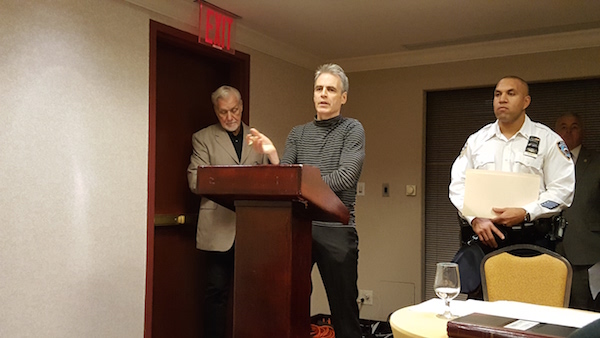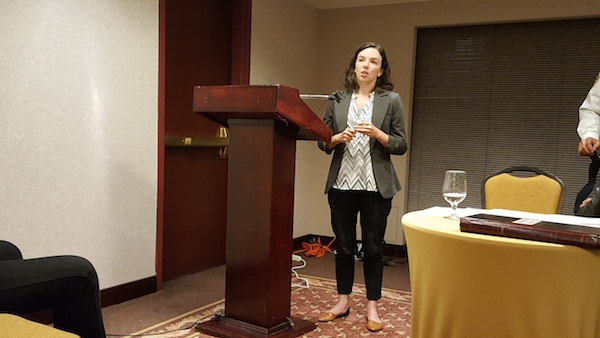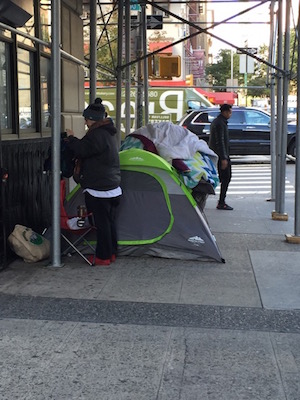
BY DUSICA SUE MALESEVIC | For the Coalition for the Homeless, a major piece of the puzzle to get people permanently off the streets is to provide housing.
Known as the “Housing First” model, a homeless individual or family gets long-term affordable housing, which, depending on need sometimes comes with support services.
Giselle Routhier, policy director for the Coalition for the Homeless, spoke about the necessity of supportive housing at the Thurs., Nov. 17 meeting of the Midtown South Community Council (MSCC). The council, led by its president, John A. Mudd, continues to work on the homelessness issue in the area.
“Supportive housing is crucial for homeless individuals who are living with severe mental illness or other disabilities, including physical [or] developmental,” Routhier told the crowd at The New Yorker hotel (481 Eighth Ave., btw. W. 34th & W. 35th Sts.). “It’s really proven to be effective at getting people housed and keeping them housed,” she added.
Housing is the first step to recovering from issues a person may be dealing with from living on the street, Routhier explained. When a homeless individual has a stable place to live, he or she can then address issues — such as substance abuse or mental illness.
As policy director, Routhier says she oversees advocacy in New York City, which is focused on housing-based solutions to homelessness. The coalition has pushed both the city and state for more supportive housing units. Mayor Bill de Blasio has committed to 15,000 units for the city, and Governor Andrew Cuomo committed to creating 20,000 units statewide.
Routhier said de Blasio has made some progress, and several hundred units are slated to come online this year. While the state legislature did allocate funding in last year’s budget for the first 6,000 units, it has yet to release that money, she explained.
“We’re in a really unfortunate gap period where the new units have not come online yet and…most of the old units are actually not funded anymore,” Routhier said, noting that there are six or seven applicants per one unit of supportive housing. “It’s a tough spot we’re in right now.”

Routhier said the coalition supports a move by the city that would require developers to set aside half of affordable housing units within a community for the homeless. Routhier was responding to a question from Allen Oster, a Community Board 4 (CB4) member; CB4 opposes the plan.
After the meeting, Oster told Chelsea Now, “I think CB4 has worked very hard to get affordable housing in our community.”
During the meeting, Routhier explained that the Coalition for the Homeless, located at 129 Fulton St., also provides 11 direct service programs, including a mobile soup kitchen called Grand Central Food Program. The coalition has three vans that run routes Uptown, Downtown and in the Bronx, which give out hot meals at set stops, she said.
The coalition was founded in the early 1980s as the result of a lawsuit. A homeless man was denied shelter because there were no more beds available, Routhier said.
A coalition founder argued that according to the New York state constitution there should be a right to shelter, and that right was established for homeless single men in the early 1980s. The right to shelter was eventually extended to homeless single women and homeless families with children, Routhier explained.
“New York City is very unique,” she said. “We’re the only municipality in the United States that has a right to shelter for families and single adults. That’s important to recognize and remember.”
According to a recent US Department of Housing and Urban Development report, which compared Los Angeles and New York City, 75% of the homeless in LA are unsheltered while that number is 5% in NYC, she said.
MSCC’s President Mudd had invited Routhier to speak at the meeting as he continues to build a consortium of agencies and organizations to help the homeless.
“When it comes to homeless, our philosophy is to do outreach, outreach, outreach,” he said.
On Mudd’s street, there was a homeless encampment on W. 38th St. (btw. Eighth & Ninth Aves.). He spent time with the people there, asking them why they were living on the street and whether they had a place within the shelter system.
Working with someone from the nonprofit Urban Pathways, Mudd worked to clean up the encampment, which he said was starting to attract prostitution and drugs.
“We gave them a lot of warning that we were coming to clean it up,” he said. “We gave them a lot of access to a lot of different kinds of shelters.”
Mudd said in a phone interview on Nov. 18 that they were very sensitive in how they broke up the encampment. The Friday before, he spent about four hours talking to people there.
“We were well-received by them because they know we want to help,” he said.

On Mon., Oct. 24, a police officer, an Urban Pathways employee, and Mudd went to the encampment. They threw out chairs, milk cartoons and garbage, but left personal belongings alone.
He said there are other encampments — W. 30th St. near Eighth Ave., and Eighth Ave. btw. W. 33rd and W. 34th Sts. — that he wants to clear by helping the homeless who live there.
The boundaries of the council are the east side of Ninth Ave. to Lexington Ave. from 29th to 45th Sts., but Mudd also helped with an encampment in Hudson Yards at W. 35th St. at Dyer Ave. (btw. Ninth & 10th Aves.).
The encampment formed about two weeks ago. However, the people have been around since the summer, said Robert Benfatto, executive director and president of the Hudson Yards / Hell’s Kitchen Alliance (a business improvement district), in a Nov. 21 email.
According to Benfatto there are no other homeless encampments in the Alliance’s area of coverage, which spans approximately between W. 42nd St. and W. 30th St., and Ninth and 11th Aves. He said homelessness is a major concern, but not a major problem.
For his part, Mudd said he is enthused with the progress he is making.
“Everyone wants to resolve the problem,” he said. “The more we continue in this direction, it’s the right direction.”
Visit midtownsouthcc.org for more information about the Midtown South Community Council. Visit coalitionforthehomeless.org for more information about the Coalition for the Homeless.


































